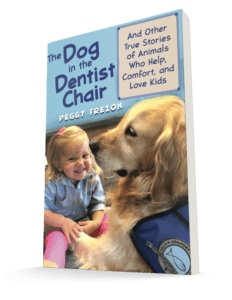Today I am honored to have as my guest Betsy Banks Saul, co-founder of Petfinder.com.
There probably isn’t a pet lover around, with access to a computer, who hasn’t heard of Petfinder. Founded 15 years ago, it is now the go-to site for bringing people together with their furever friend. I am delighted that I found Kelly through Petfinder! I think back to how we got our pets when I was a kid. Some people bought a purebred dog from a responsible breeder. But more often than not, the people I knew got a puppy or kitten from some neighbor whose dog had a litter, because in those days the dogs and cats almost all ran loose, and almost none were fixed.
Today we know a lot more about responsible pet ownership and overpopulation. Most people I know have their pet spayed or neutered. And most people know about the horrible, inhumane conditions of puppy mills and pet farming. However, many people are still purchasing puppies from pet stores.
A recent press release that arrived in my mailbox posed the question: Does the average American family realize that the “doggy in the window” most likely comes from a Puppy Mill? Do they know the repercussions when they choose to purchase a puppy from a pet store? I asked Betsy about this as we talked on the phone last week.
Me: Where are most people getting their pets today?
BBS: We all know that puppy mills are bad and adoption is good, yet less than 25% of pets coming into homes come from shelters. People walk by a pet shop in the mall and see that furry face in the window and they want to buy it now. Even people who are committed to animal welfare may see that adorable puppy in the cage and fall in love.
Me: How can people tell that the pet they are buying comes from a puppy mill?
 BBS: Many pet stores have signs in front that say “Our Puppies are Not From Puppy Mills” but in the vast majority of cases that is so not true! How do we know? Because a responsible breeder would not sell to just anyone. They would want to interview you. They would want to ask you questions about things such as how much time you would be home and what your yard is like. What responsible breeder would not want to meet the potential pet parents?
BBS: Many pet stores have signs in front that say “Our Puppies are Not From Puppy Mills” but in the vast majority of cases that is so not true! How do we know? Because a responsible breeder would not sell to just anyone. They would want to interview you. They would want to ask you questions about things such as how much time you would be home and what your yard is like. What responsible breeder would not want to meet the potential pet parents?
Me: Some people feel that by purchasing a pet shop puppy, they are at least saving one life. While admirable, is this misguided?
BBS: Unfortunately, yes. They may be giving that dog a better home than it knew before. But they are perpetuating a terrible, terrible industry. In addition, puppy mills produce pets that are more chronically afflicted with disease and socialization issues.
Me: How can we understand why puppy mills continue to exist? Why are they legal in some states?
BBS: The reason puppy mills exist is because they are profitable. Look at proposed laws aiming to regulate conditions and standards for dog breeding, such as Proposition B in Missouri. Who was against it? Pet industry brokering and shipping companies, and also the agricultural community feared that this would be a gateway for regulations for all of agriculture.
Me: What can we do?
BBS: 1. Don’t shop for pets in pet stores.
2. Spread the word.
3. Adopt a shelter pet.
4. Consider fostering a pet.
5. If you’re on Twitter, tweet about an adoptable pet on Petfinder on Tweet a Pet Tuesday.
Me: Thank you Betsy for joining us today, and helping shed some light on this problem. As you know, Petfinder is where I got my dog Kelly and she’s been the best friend ever! I hope everyone who is looking to add a cat or dog or other pet to their family will look into Petfinder.
With 181,000 homeless dogs on Petfinder.com right now, there are many options for people who want a family pet. Simply type in your zip code and the criteria you are looking for – whether it’s a purebred, a large dog, an older pet with special needs or a young pup who is house-trained – Petfinder.com will show you all potential canine companions who are in need of homes starting with those closest to you.




